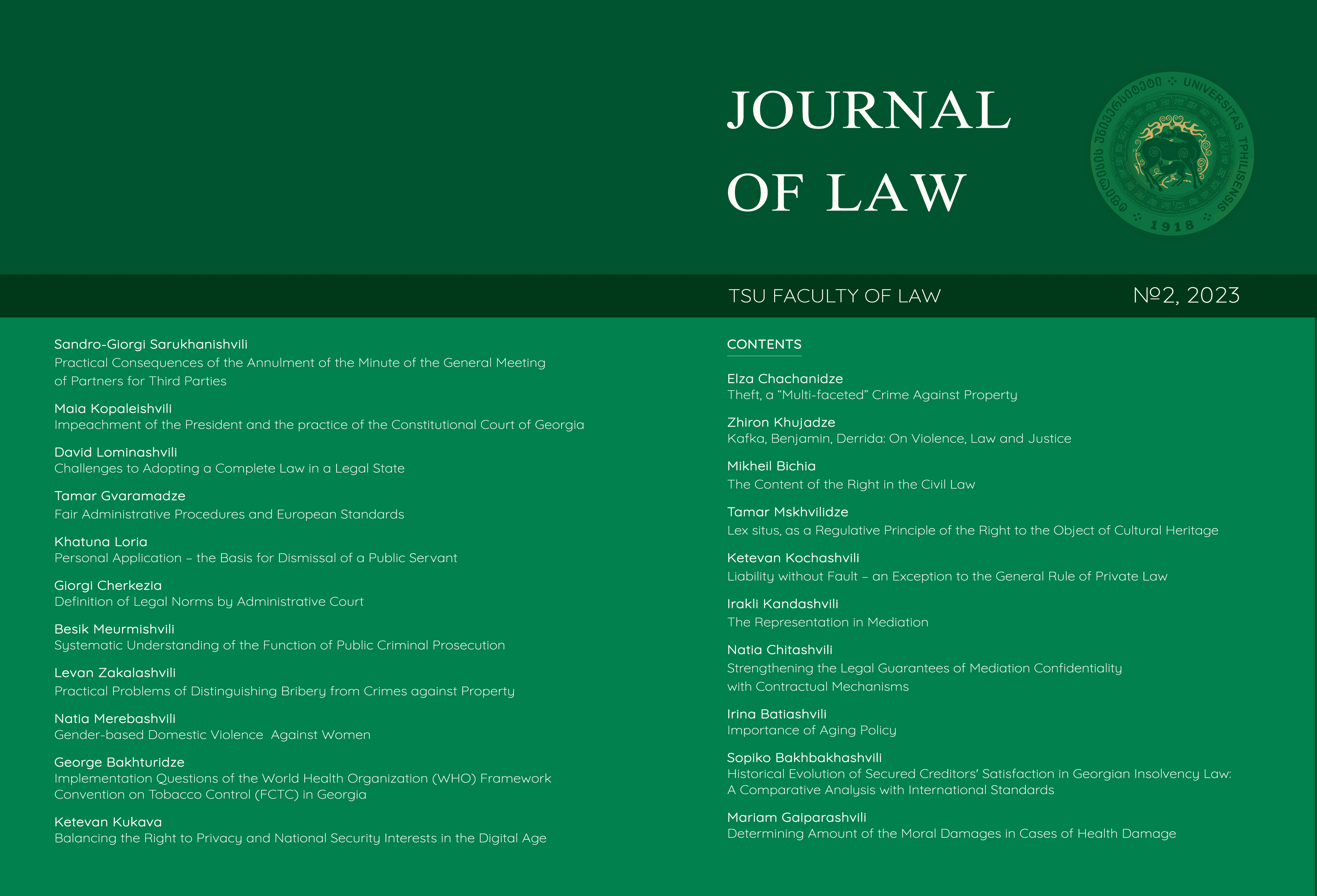Historical Evolution of Secured Creditors' Satisfaction in Georgian Insolvency Law: A Comparative Analysis with International Standards
DOI:
https://doi.org/10.60131/jlaw.2.2023.7699Keywords:
Fulfilling Secured Creditors' Requirements, Historical Overview, International Standards, Comparative Analysis, Prioritization of Secured Rights.Abstract
Secured creditors hold a pivotal position in shaping the business sector, given their substantial market influence. To ensure their protection, it is essential that the regulatory norms governing insolvency in the country adhere to internationally recognized standards. In pursuit of this goal, the Law of Georgia "On Rehabilitation and The Collective Satisfaction of Creditors' Claims," enacted on April 1, 2021, is noteworthy. This legislation, diverging significantly from its predecessor, meticulously addresses the role of secured creditors and delineates the criteria for their satisfaction within the framework of Georgian insolvency law.
The objective of this paper is to conduct a systematic analysis of the role played by secured creditors and the historical evolution of satisfying their requirements within the framework of Georgian insolvency law. Simultaneously, the study aims to assess how the enacted Georgian insolvency law aligns with the recommendations, principles, and directives of international organizations.
References
Insolvency Act 1986, UK.
German Insolvency Code, 05.10.1994.
Law of Georgia “Civil Code of Georgia”, the Gazette of the Parliament of Georgia, N786, 24.07.1997.
Law of Georgia “Tax Code of Georgia”, Legislative Herald of Georgia, N3591, 12.10.2010.
Law of Georgia “on Bankruptcy Proceedings”, the Gazette of the Parliament of Georgia, N286, 30.07.1996.
Law of Georgia “on Insolvency Proceedings”, Legislative Herald of Georgia, N4522, 31/03/2007.
Directive (EU) 2019/1023 of the European Parliament and of the Council of 20 June 2019,
Law of Georgia “on Rehabilitation and the Collective Satisfaction of Creditors' Claims”, Legislative Herald of Georgia, N7165-Iს, 25/09/2020.
Brinkmann M., The Position of Secured Creditors in Insolvency, European Company and Financial Law Review, 2008, 249, 251.
Eidenmuller H., Secured Creditors in Insolvency Proceedings, European Company and Financial Law Review, 2008, 274.
Kadaria S., Historical Development of the Rehabilitation Process, Journal of Law, №1, 2022, 197 (in Georgian).
Kasak A., Is Full Preference for a Secured Claim in Insolvency Proceedings Justified?, Juridica International, 2019, 113.
Keay A., Insolvency Law: A Matter of Public Interest?, Northern Ireland Legal Quarterly, 2000, 1.
Meskhishvili K., Batlidze G., Amisulashvili N., Jorbenadze S., Fundamentals of Insolvency Proceedings in Accordance with the Law of Georgia on Rehabilitation and the Collective Satisfaction of Creditors’ Claims, Tbilisi, 2021, 50, 78-79, 83 (in Georgian).
Migriauli R., Introduction to Bankruptcy Law, 2nd Revised Edition, Tbilisi, 2006, 70-72, 84-85, 90-91, 96-99 (in Georgian).
Migriauli R., Key Features of the New Insolvency Law, Journal “Business and legislation”, 2009 (in Georgian).
Schnitger H., Migriauli R., The Law of Georgia on Insolvency, Characterization and Comparison with the Law of Georgia on Bankruptcy Proceedings and International Standards, Tbilisi, 2011, 51, 83, 90 (in Georgian).
Zarandia T., Jugheli T., Securing Claims with Movable Property in Georgian Law, Legal Journal of Judges Association of Georgia “Justice and Law”, N2, 2009, 27 (in Georgian).
The European Law Institute (ELI), Instrument of the European Law Institute, Rescue of Business in Insolvency Law, 2017.
The Government of Georgia, Strategy for the Socio-Economic Development of Georgia, Georgia 2020 (in Georgian).
International Monetary Fund, Ordinary and Effective Insolvency Procedures, Legal Department, 1999.
ISET, Regulatory Impact Assessment (RIA) of the selected topics under the Draft Law on Rehabilitation and Collective Satisfaction of Creditors, Final Report, 2019 (in Georgian).
Ministry of Justice of Georgia, Explanatory Note on the Draft Law of Georgia on Rehabilitation and the Collective Satisfaction of Creditors' Claims (in Georgian).
United Nations Commission on International Trade Law (UNCITRAL), Legislative guide on insolvency law, United Nation, New York 2005.
United Nations Commission on International Trade Law (UNCITRAL), Legislative Guide on Secured Transactions, United Nation, New York 2010
United Nations Commission on International Trade Law (UNCITRAL), Model Law on Cross-Border Insolvency with Guide to Enactment and Interpretation, United Nation, New York 2014
The World Bank Group, Principles for effective insolvency and creditor/debtor regimes, Washington DC, 2016.
The World Bank Group, Principles for effective insolvency and creditor/debtor regimes, Washington DC, 2021.
https://subnational.doingbusiness.org/en/data/exploretopics/resolving-insolvency/score [20.06.2023].
https://eur-lex.europa.eu/legal-content/EN/TXT/PDF/?uri=CELEX:32019L1023 [24.07.2023].
Downloads
Published
How to Cite
Issue
Section
License

This work is licensed under a Creative Commons Attribution-ShareAlike 4.0 International License.









